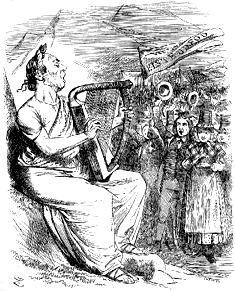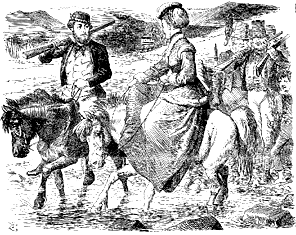



The Political Life of Gladstone
In 1897, Punch published The Political Life of the Right Hon. W.E. Gladstone: Illustrated with Cartoons and Sketches from Punch, in three volumes. There is an interesting comment on the cartoon "Homer in Wales", which I think it useful to quote:
"On August 19 [1873], Mr. Gladstone presided at the Welsh National Eisteddfod at Mold, and made a highly characteristic speech, curiously indicative of that persistent sympathy with the spirit of nationalism which was to find fuller expression in the future. He complimented his hearers on the fact that 800,000 people still clung to their native tongue in spite of all the pressure which had been put upon them. Such however, he continued, was the loyalty of the Welsh people, that their heart had never been alienated from the throne and the laws of the country. The Welsh were a people of deep and strong religious sympathies, but in those sympathies they had been deeply, most unjustly, and even madly thwarted. To their great honour they had made provision for themselves for their own religious wants. What a lesson that was upon the false policy which had been pursued! We had endeavoured to hector them into the abandonment of their language; they had clung to it with unexampled fidelity. 'Yours' (said Mr. Gladstone) 'is an ancient language, and the language is connected with an ancient history, and it is connected with an ancient music, and with an ancient literature. It is a veritable relic of the past, and there is no greater folly circulating upon the earth than the disposition to undervalue the past and to break those links which unite human beings of the present day with the generations that have passed away.' It hardly requires much ex post facto straining to detect in these expressions of respect both for links with the past and for racial individuality and independence, the spirit, at least, of his later Home Rule policy, his fixed belief in the possibility of combining the maintenance of national spirit and pride with general loyalty to the composite Empire. "(1)
This cartoon, by Sir John Tenniel,and its caption, published in 1873, and the above quotation from 1897 both seem to resonate with an unspoken comparison to the other Celts, the troublesome Irish. The fact that Gladstone, should have presided over the Eisteddfod, or Bardic congress of Wales, and that he should have spoken so sympathetically about the Welsh language and history, shows a conciliatory spirit toward the Celts. The same spirit is expressed in Matthew Arnold's On the Study of Celtic Literature. Arnold wanted the English to appreciate the Celts, including the Irish, as being fellow-members of the Indo-European race, and as possessing valuable talents in language, literature, and the creation of beauty; he felt the Celts could counteract English middle-class philistinism. But at the same time, Arnold's and Gladstone's praise for the artistic side of the Celts is a back-handed compliment: they had fine qualities of mind, but they were not doers, workers, accomplishers, organizers. The Celts, it was implied, were not practical; they clearly needed guidance. Thus, as the cartoon's caption states, Gladstone "strongly urged every Welsh person to learn English"; national spirit was admirable up to a point, it was felt, but the governing of Great Britain from London required, in practice, considerable uniformity and centralization.
The actual drawing of the cartoon is, in this instance, significant. Tenniel has drawn the Welsh peasantry as benign Celts, with pleasant expressions and virtually Anglo-Saxon physiques. (I have come across only one Tenniel drawing of comparably attractive Irish peasants--"The Irish Balmoral, or a Vision of 1869"-- [See the second cartoon, above, Punch , LIV (May 2, 1868): 193] and it is an unusually bland and characterless drawing. Perhaps Tenniel could hardly bring himself to draw civilized Irish peasants.) In most Tenniel cartoons, the Irish range from simian to monstrous. So it is noteworthy that these Welsh Celts look, in contrast, non-threatening and agreeable.
To sum up, this cartoon shows Gladstone's dedication to liberalism, but also warns that he and the British government definitely expect uniformity, obedience, and loyalty from the Celtic citizens. It also leaves a strong impression of the "good Celts" of Wales, as opposed to those other unmentioned Celts across the Irish Sea.
1. Punch, the Political Life of the Right Hon. W.E. Gladstone: Illustrated with Cartoons and Sketches from Punch, vol. 1 (London: Bradbury, Agnew, and Co., Ltd., 1897), pp. 299-300.
Source: http://projects.vassar.edu/punch/harding.html